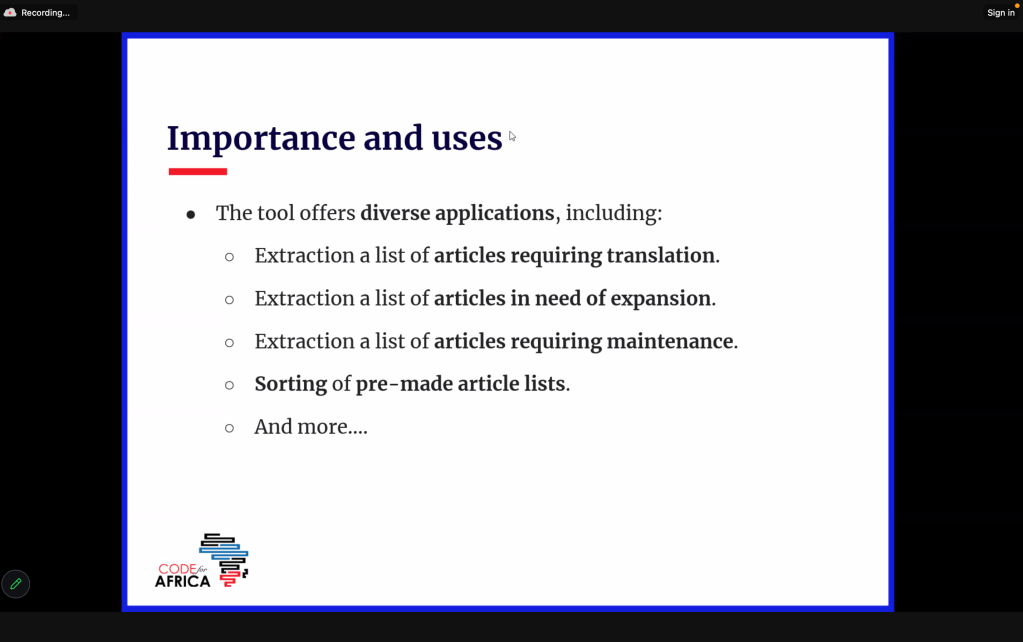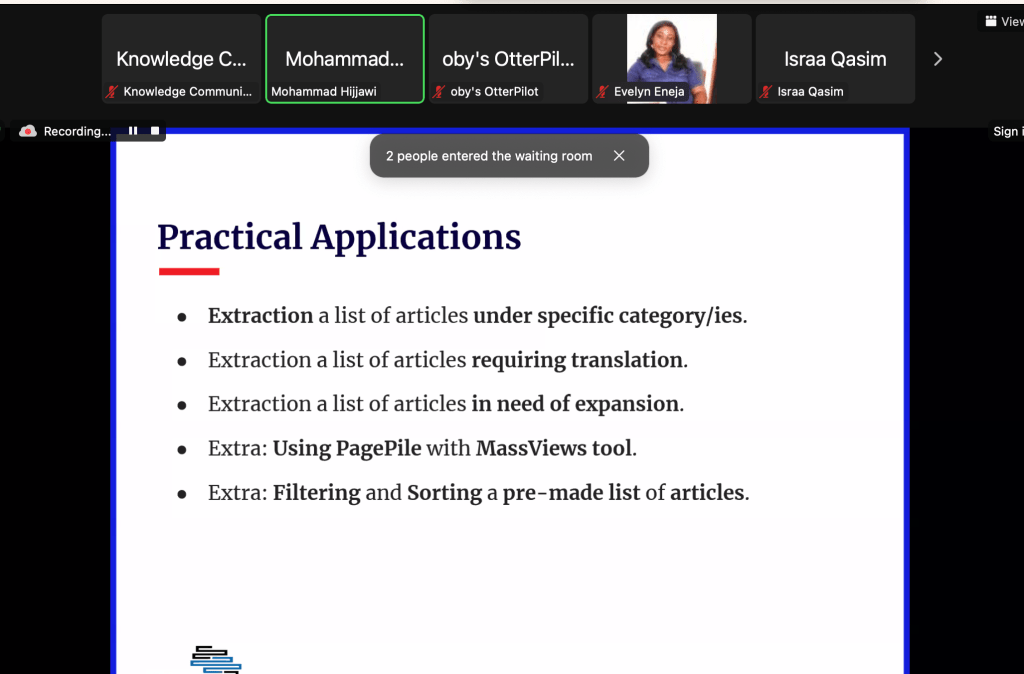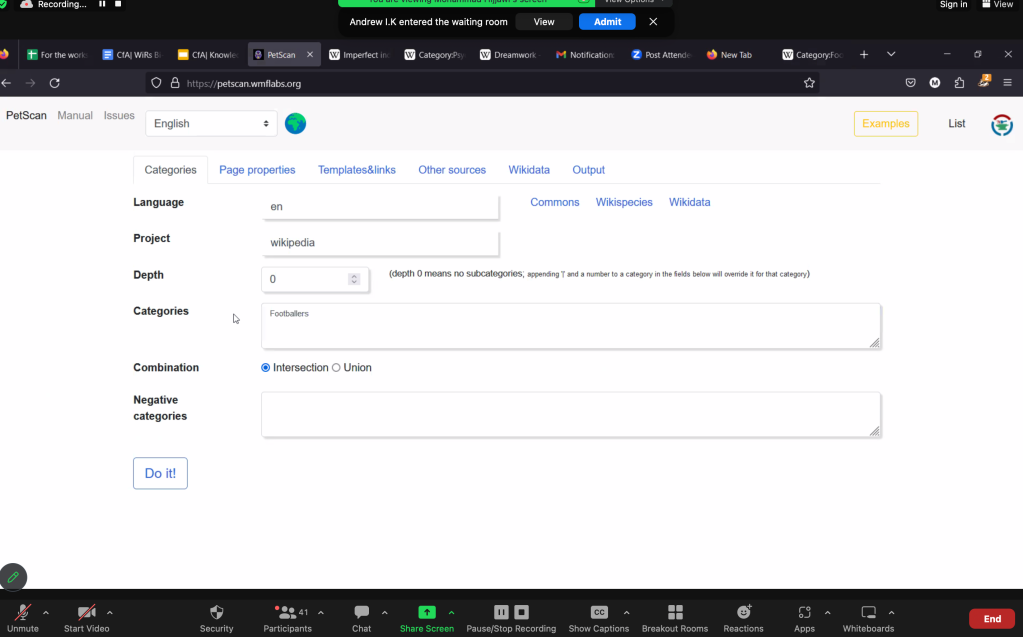Code for Africa (CfA) continued its pursuit of empowering the Wikimedian-in-Residence (WiR) community through its biweekly webinar series. On the 3rd of August 2023, CfA hosted a webinar centred on “Using the Pet Scan Tool on Wikimedia Projects”. The webinar was led by Mohammed Hijjawi, a member of the Wikimedian of the Levant, renowned for his mastery of the Pet Scan tool. Facilitating the webinar was Bukola James, CfA’s WiR community coordinator. The webinar saw a commendable turnout, with 40 eager participants joining at the outset and an engaged group of 32 dedicated Wikimedians who remained throughout the session. The geographic diversity was apparent, with participants hailing from Cameroon, Côte d’Ivoire, Ghana, Mauritius, Nigeria, Rwanda, South Africa, Turkey, and Uganda.
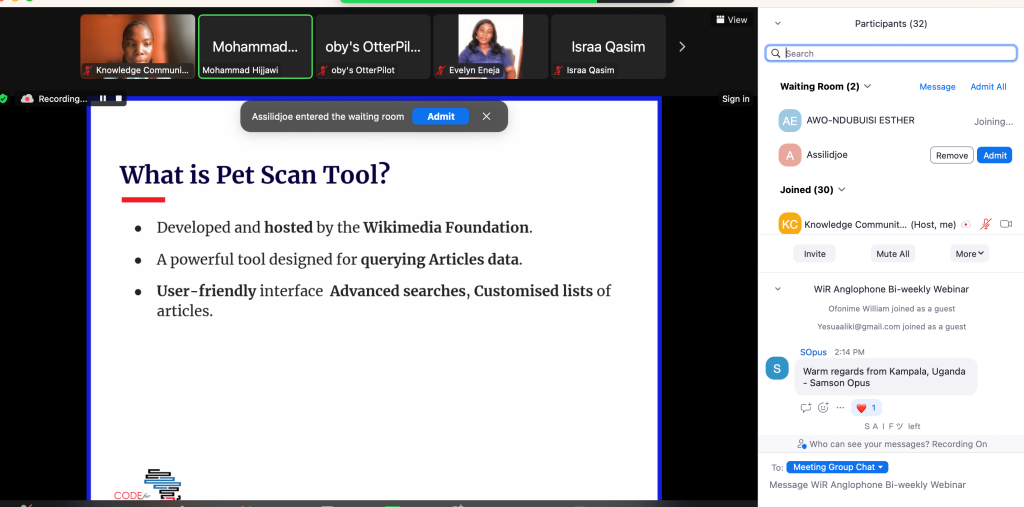
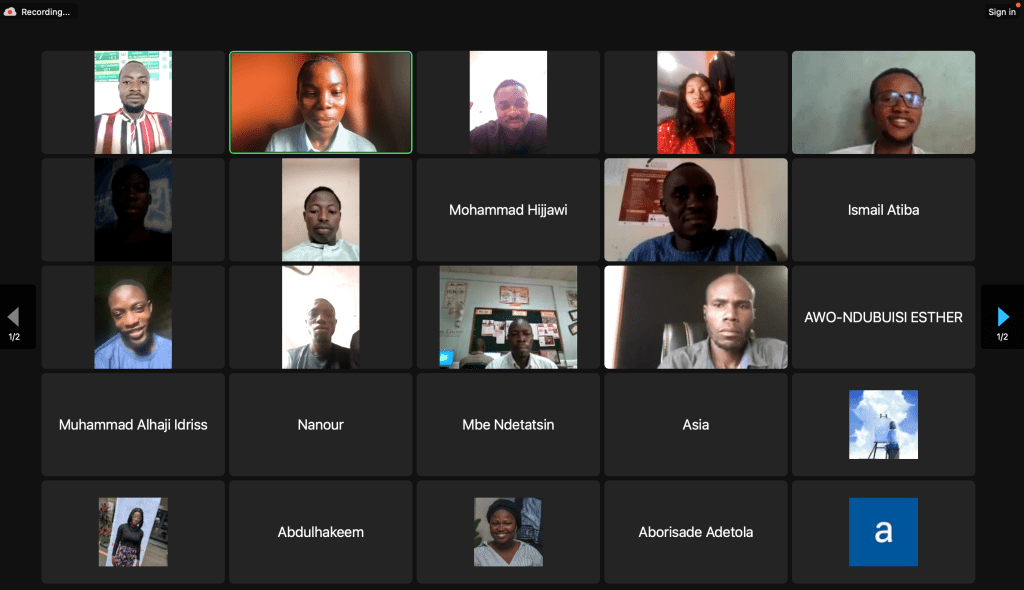
Session Highlights
Kicking off the session, Mohammed provided an overview of the Pet Scan tool, its functionalities, and its significance in the Wikimedia ecosystem. More than just an introduction, Mohammed delved into the nitty-gritty, adopting a hands-on approach to effectively demystify the tool’s complexities.
For those unfamiliar, Pet Scan stands as a beacon in the Wikimedia universe, offering advanced search capabilities tailored to Wikimedia projects. It serves as a conduit for Wikimedia editors, enabling them to extract articles requiring translation, pinpoint those needing maintenance, or categorising articles by view count. Its capabilities or functionalities transcend the standard search, enabling users to refine searches based on numerous parameters, unlocking great potentials in various domains;
- Enhancing research and retrieval of articles, especially for Wikimedians involved in large-scale projects.
- Elevating contributions of every Wikimedian by harnessing the tool’s prowess to build a robust encyclopaedia.
- Efficiently pinpointing articles resonating with specific criteria.
- Seamlessly organising and structuring their discoveries.
- Revolutionising workflows, especially when navigating vast data landscapes.
Practical Deep Dive into Pet Scan
The practical deep dive into the pet scan tool was the heart of the session which provided African Wikimedians with the nitty-gritty and thorough hands-on Pet scan exercises focused on:
- Efficient Multilingual Compilation: Traditional methods of creating multilingual article lists were discussed and quickly juxtaposed against Petscan’s efficient methodology. The ease of generating multilingual lists, especially for languages like Arabic, English, and French, was underscored, using article categories, language customisation, project, depth, categories, combination, namespaces, templates, and format.
- Article Translation and Expansion: Mohammed used ‘Politics’ as a practical example, illustrating how to pinpoint and enlarge French Wikipedia articles on this topic. His tutorial began by guiding attendees on sourcing articles from English Wikipedia, then seamlessly transitioning into translation methods. Responding dynamically to real-time participant feedback, Mohammed fine-tuned the search criteria as needed. A case in point was an attendee fluent in both Arabic (primary) and English, who expressed an interest in ‘psychology’ articles. This live interaction underscored the tool’s demand for accurate input, showing how slight variations in category labels could lead to off-mark search outcomes. Highlighting the content void in African languages, especially the Ga language, Mohammed emphasised Petscan’s capability to mitigate these content disparities.
- Managing and Extracting Article Lists: Mohammed illustrated the process of classifying articles, transferring content into spreadsheets, and the effective generation of article lists. Furthermore, he showcased the intricacies of extracting articles requiring maintenance, like those in need of citations, particularly in the Arabic language.
- Harnessing View Counts: Mohammed introduced an innovative approach centred on extracting and ranking Wikipedia articles according to their view counts across different languages using the mass-view tool. This strategy not only sheds light on the most frequently visited articles but also emphasises the need for these articles to uphold the highest quality. By presenting contributors with such metrics, Mohammed highlighted how they can be greatly motivated, seeing the tangible impact and reach of their work. He detailed the use of the mass-view tool to sort articles by their viewership, emphasising that focusing on high-traffic articles ensures consistent quality. The underlying message was resonant: “Recognising and catering to audience preferences can significantly elevate user engagement.”
- The Final Lap: The session neared its conclusion with a comprehensive guide on efficiently handling multilingual articles. With tools like ‘Pet Scan’ and other Wiki-specific utilities, attendees learned about optimising processes, from hyperlink integration to transferring data across platforms like Google Sheets and Excel. Furthermore, acknowledging the tool’s complexity, Muhammad hinted at potential future sessions with more detailed guides and emphasised the importance of hands-on experimentation whilst encouraging participants to review the recorded session.
Best Practices, Tips, and Cautionary Tales
Adding value, Mohammed sprinkled in best practices, and insider tips, and highlighted potential pitfalls, to ensure an optimal Pet Scan experience for all the webinar attendees which include but are not limited to;
- Precision over Volume: While Pet Scan is potent, it’s crucial to be specific in search criteria to avoid overwhelming results.
- Language Nuances: Understanding linguistic intricacies, especially when dealing with multilingual content, ensures better search outcomes.
- Efficient Data Management: He stressed the importance of correctly exporting data, highlighting Petscan’s versatility in offering formats like HTML: webpages, CSV: values in quotation marks, separated by commas, TSV: Tab Separated Values, WIKI: as Wikitable, PHP: as PHP file, XML: as an XML file.
- Stay Updated: Petscan, like all tools, undergoes updates. Staying abreast with these ensures you are not caught off guard.
- Template Usage: Mohammed underscored the importance of recognising specific templates, especially when identifying articles requiring maintenance.
Handy Links
- Practical Session recording
- Test your knowledge of the pet scan tool on academy Africa
- Articles in a WikiProject
- Dablinks within a WikiProject
- Detecting pages that have an anomalous combination of namespace and category/ies
- Find uncategorized photo contributions in Commons in a given language
- Items with no statements
- d:Help:Import Template:Bio from itwiki
- Get the sitelinks for a certain project from a SPARQL query
- Get a list of Wikidata items with exclusions based on a SPARQL query
Feedback and Reflections
As the session wrapped up, the floor was opened to questions, and participants eagerly shared their thoughts:
“Awesome session. The Pet Scan tool is a very good one”
Ogundele1
“I’m glad to have gained some new knowledge today”
Opusmo
“Thank you, it was very clear, interactive and motivating”
Saraswati 1111
“I need to individually practise the effective use of this tool. It is so vital”
ikisraela
“Thanks for the amazing session”
Atibrarian
The PetScan webinar is part of our goal of enhancing the abilities of the African Wikimedian community. These sessions not only share knowledge but also build global bonds, promoting unity and shared goals.
Excited to join our next event? Navigate to the community programmes page. Ensure you’re registered for the upcoming CfA WiR Bi-weekly webinar and immerse in our vibrant community. To stay abreast of our initiatives, complete this form, and let’s shape the future together!

Can you help us translate this article?
In order for this article to reach as many people as possible we would like your help. Can you translate this article to get the message out?
Start translation
